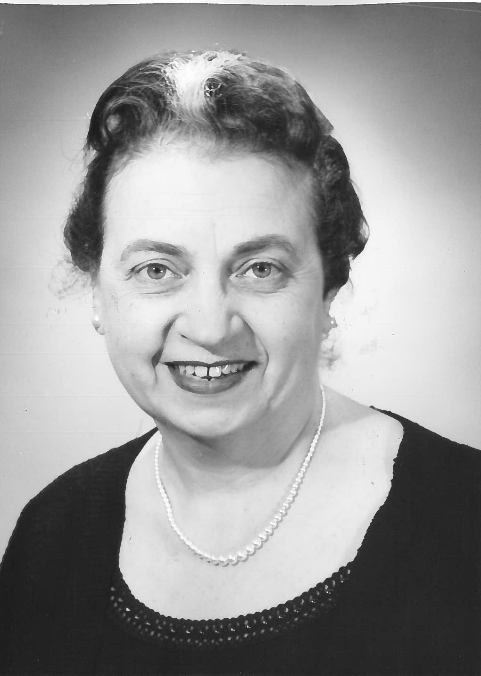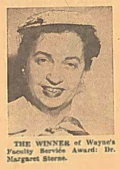Celebrating the life and legacy of historian Margaret Sterne
In the late 1940s, Margaret Sterne was taking a graduate-level course that met twice a week at the University of Michigan, where she was pursuing a Ph.D. in history. Because she was unable to attend one of the weekly sessions, her son Karl, an undergraduate at Michigan at the time, took notes for her. The first time he showed up, another student whispered to him that he couldn't sit there because a "girl" was "assigned" to that seat. "That's no girl," Karl supposedly whispered back, "That's my mother!"

Sterne went on to receive her Ph.D. in 1951. She had already received an M.A. a decade earlier at Wayne State, where she began teaching history in 1942, and where she would remain until her retirement in 1971 - the only female member of the department at that point. According to her colleague Richard Miles, reminiscing in the late 1990s, "a few of her senior colleagues, born at the turn of the last century, never could quite accept the idea that a woman could be taken seriously as a scholar." In fact, "For quite some time, she was expected to arrange the department's social functions" but "met these difficulties with dignity and valor. Her students told us that her classes in German history were enjoyable and challenging." Still, she remained one of a "relatively small number of women who managed to make important contributions to academe before today's improved attitudes came to prevail."
Sterne was born in Frankfurt am Main in 1904 and did both undergraduate and graduate work at the University of Berlin in the early 1920s during the Weimar Republic, at a time when it had become somewhat easier for German women to receive a higher education. She emigrated to the United States in 1925, working first as a corresponding editor of the Ullstein Publishing House in New York and Detroit. She later took a position as the rotogravure editor for the Detroit News in the mid 1930s, and served during World War II as publicity director for the U.S. Treasury's Michigan War Finance Committee. According to a 1944 blurb that appeared in the Detroit Free Press, her coworkers at the War Bonds headquarters "marveled" at her energy. The article - tellingly titled "Zealot" - explained that her "enthusiasm stems from a conviction that War Bonds will lick inflation and she knows inflation all too well." A children's magazine that she had edited in Germany as a young woman sold for the equivalent of about 10 cents in 1922: "Within one year, the wild German inflation drove the price of a single copy to 60 million marks!" - a memorable anecdote she no doubt shared with her students at Wayne State.
A year after receiving her Ph.D., Sterne was awarded a Fulbright research scholarship to study in Vienna, the capital of Austria, which was still occupied at the time by the victors of World War II, including the Soviet Union. According to a newspaper report, her husband Bernhard, an engineer at Chrysler, only "reluctantly gave his consent" for her to accept the prestigious award. During her subsequent stay, a member of the American State Department told her - after overhearing her mocking "Red [i.e., communist] lies" - that she was a "natural for propaganda and asked her to "sell American democracy for us." She went on to hold a series of lectures in front of audiences whose "minds had been won by Red fantasies about America" - but whose members now "listened intently to a blue-eyed, motherly woman" (the article also described her appearance as that of a "pleasant housewife") who still spoke fluent German "marred only by a slight tendency to fall back on American slang expressions in emergencies."
During these lectures, "Mrs. Sterne" (sic) dispelled rumors that Detroit was a "savage place where white brutes hunt down Negro workers and beat them" - an obvious allusion to the violent 1943 race riots. "At Wayne University negroes play football beside white friends," she assured them, "You've been misled by distorted accounts of a race riot. But that misunderstanding has long since been cleared up." She also endeavored to explain the American political system to those she met: "In our family there are two Democrats and two Republicans and we all love each other." And, with regard to issues of "race" (sic): "In Detroit on Columbus Day we celebrate with the Italians and on St. Patrick's Day we wear green costumes and drink green beer." In the end, the article suggested, the State Department was almost glad to see her leave because her "propaganda" had been so effective that "Americans found themselves besieged by pleading Germans [sic]" who "demanded to know, 'How can I get to Detroit?'"
The State Department nevertheless invited her back three years later to give another series of fifteen lectures - this time in both Austria and her native Germany - which "interpreted the American way of life to the free world." Upon her return, she gave another thirty lectures to local community groups in Detroit, where she spoke about the "heritage Americans have received from Europe." (She would later present a lecture at the Wayne State Faculty Wives Club with the suggestive title, "Are American Women Happier than European Women?") Beating out forty other nominees, Sterne received the Alumni Association's Wayne Faculty Award for this lecture series - only the fourth woman to have received the prize. In 1959, she was the recipient of an even more prestigious honor: the Federal Republic of Germany's Order of Merit First Class for "furthering German-American cultural ties."

Sterne was not a prolific historian, by today's standards. She published several articles that drew on local archives, such as the Burton Historical Collection; this included one on Michigander William Walton Murphy, who served as American Consul General to her native city of Frankfurt in the 1860s.
She also wrote dozens of newspaper articles - among them an extremely interesting piece that appeared in the Free Press upon her return from Vienna in 1953. It addressed a question about which she had often wondered during her stay abroad: to what extent had there been a "genuine return to Christianity" in West Germany since the end of the war?
The article emphasized the pervasive sense of "guilt" and "deep sense of responsibility, of shame" for the crimes committed in the name of the German people. Sterne reassured her readers that Christianity remained a "living force" there and had never been "wholly exterminated during the Third Reich" - a remarkable choice of words. (She did not mention the Holocaust specifically - few did at the time - but did describe a disturbing encounter she had had on a train, where two veterans "bragged" about their [unspecified] "deeds in Poland" during the war.) Sterne wistfully noted that many houses - including that of her parents - had been destroyed during the aerial bombings, "but the churches remained intact Could it be interpreted as a symbol?" she wondered. In any event, those who had witnessed as teenagers the "horrors" of National Socialism were now "anxious to join a Christian Western World."
Sterne's sole academic monograph appeared posthumously in 1980, a study of William Valentiner, the director of the Detroit Institute of Arts from 1924 to 1945. The German-born Valentiner, the person responsible for commissioning the Rivera murals, was known for having transformed the DIA from a "small provincial gallery" (as the Detroit Arts Commission put it upon his departure) into a "great museum." Sterne's choice of subject was not by chance: following her retirement from the Department of History, she worked throughout the 1970s as a research associate at the DIA.
Margaret Sterne died in 1977 at age seventy-three. In a memorial that appeared in the American Historical Review upon her death, her colleague Goldwin Smith wrote that she would be "remembered by her students as a superb teacher, a kindly and compassionate counselor, and a professor who was sincerely interested in them. Her colleagues know what she did for the department, the university, and the city of Detroit. It was a great deal indeed." That appreciation found expression in two memorial funds set up at the time: the Dr. Margaret Sterne Student Fund for Hilberry Theatre (she became chair of the first "Understudies" group at the Hilberry in 1964) and the Margaret Sterne Memorial Fund. More recently, G. Michael Loewe, a 1973 graduate of Wayne State who majored in history and economics, established the Sterne-Lion Undergraduate Research Award in her honor.
Photos courtesy of Gayle McCreedy.
Andrew I. Port, Department of History